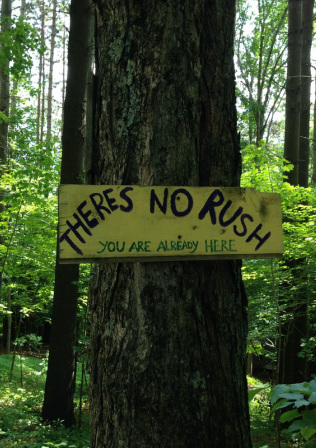| "Silence is praise to You, God in Zion, for the fulfillment of vows belongs to You" – Psalms 65:2 I've just spent a week in a place that I come to every year to re-center my soul and find a bit of quiet and peace before the craziness of the High Holy Days begins. I treasure this time with my family in a sleepy New England fishing town where the most impressive thing to listen to is the crashing of the waves onto the shore. | |
We all need something like this in our lives. Each of us needs a way to escape from the usual patterns of our daily lives and retreat to a place of safety that allows us to consider, to ponder, to relax and to just be. We need a time and a place for the silence to enfold us.
Moments like this are more than just relaxing. They can be deeply spiritual. It is in the places of quiet and stillness that we are able to notice our own presence in the world in a way that is nearly impossible while we are engaged in the business of doing things, getting things done, striving and managing. The still moments are the ones in which we become aware of the miracle of existence and the treasure of being alive.
We need to do things in life, but, just as much, we also need quiet moments to digest the meaning and ponder the purpose of our activity. Such moments, however, are becoming harder to find in our hyperactive society. We are always in a rush. Television teaches us that silence is awkward and frightening. (Have you ever known someone who leaves the television or radio on all day just to avoid silence?) The habit has even become part of conversational patterns in which people constantly interrupt each other to avoid the possibility of a gap between speakers.
Let me ask you right now, while you are reading this, to try an experiment. Close your eyes, slow your mind, relax your breathing, be aware of your body, and just sit in silence for a few minutes. When you notice yourself getting itchy with the urge to open your eyes and do something, just let that feeling to be something else to be aware of. Let the itchiness subside and allow yourself to enter a moment of even deeper peace. It feels good – doesn't it?
It is altogether appropriate to make time for such moments in worship. The Jewish worship service is filled with moments for silence and stillness. Traditionally, the T'filah prayer (also called the Amidah or the Sh'moneh Esrei) is first recited aloud by the worship leader, and then silently by each individual in prayer. Also, in most traditional Ashkenazic services, much of the morning blessings are recited silently by each individual with the worship leader only chanting an occasional verse or two to keep everyone more-or-less in the same place. The opportunity for silence gives each worshiper a moment of stillness and the spiritual space to encounter God. We discover, in such moments, that silence is a form of praise to the God who fills all silences.
In liberal Judaism, we sometimes try to squeeze the silence out of our services. Out of a desire to shorten the service – or, perhaps, out of fear that people won't know what to do during silence – we fill every moment with words and songs. I think that is a mistake. I think we need to give people a chance during worship for the many words of the liturgy to sink in. We need to give people a chance to have their own thoughts. We need to take the risk that moments of quiet can be more than moments of itchy emptiness.
| When I lead services, I leave quiet time for people to pray the T'filah individually. I wait for everyone to finish before moving on with the service – even when the quiet sometimes feels uncomfortable for some worshipers. I sometimes find other moments for silence in the service – before the chatzi kaddish, after a song or a chant, or even for procession of the Torah scroll. I think moments of silence are a way for service leaders to show our respect for the congregation – respect for each person's ability to have his or her own spiritual moment unmediated by our brilliant words or beautiful music. We can allow the silence to be the most eloquent way to praise God. We can discover that God is present in the quiet moments. We become aware that we are, perhaps, better at hearing God when there are fewer noises to distract us. |


 RSS Feed
RSS Feed
